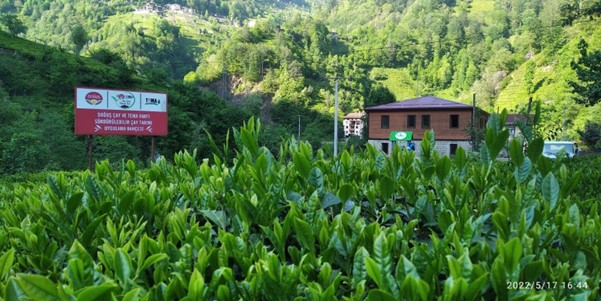Case study: Each Tea Brew is for the Soil (In Turkish: Her Dem Toprak İçin)

Photo acknowledgement: ESRA DÜZGÜN BAYTEKİN esra.baytekin@tema.org.tr
- Vocational, General public
- Outdoor
- Campaign / event, Demonstration site / trail, Experiment
- Turkey
Each Tea Brew is for the Soil (In Turkish: Her Dem Toprak İçin)
The “Each Tea Brew Is for the Soil” project (in Turkish: “Her Dem Toprak İçin”)
is a Corporate Social Responsibility (CSR) initiative undertaken by a private tea production company. The project was implemented between 2016 and 2023 in the eastern part of the Black Sea Region of Turkey. The project aimed to address soil degradation in tea-growing areas and promote sustainable tea agriculture through training and practical demonstrations in the Rize region, where the soil had become acidic from prolonged exposure to excessive chemical fertilization in tea cultivation over many years.
The project was funded by Doğuş Çay, a private tea producer, in collaboration with the TEMA Foundation (TEMA, Turkish Foundation for Combating Soil Erosion, Desertification and Protecting the Country’s Natural Assets), a leading civil society organisation in Türkiye. The project’s target group was tea farmers and workers, experts, religious officials, women, teachers, university students, and children of tea farmers.
Objective
The “Each Tea Brew Is for the Soil” was a widespread awareness and education project aimed to raise awareness about soil health issues in tea-producing regions, particularly in Rize, and to implement measures to combat soil degradation.
The objectives were:
– To provide face-to-face training to tea producers (tea farmers), experts, religious officials, women, teachers, university students, and children of tea farmers.
– To establish demonstration tea gardens to demonstrate sustainable agricultural practices.
– To emphasize the importance of soil quality and propagate efficient tea plant species.
Approach
In the initial phase, awareness training was provided to the target audience, and consensus was sought among stakeholders involved in tea production.
The use of Ammonium Nitrate fertilizer was banned in the region during the project period, leading to a reduction in soil acidification.
In the second phase of the project, thousands of tea producers, women tea farmers, experts, and religious officials were trained annually between 2017 and 2023.
Sapling variety gardens were established using high-yielding tea clones, and project activities were demonstrated in demonstration gardens in the region.
Composting techniques utilising tea waste were promoted to improve soil acidity.
The project was able to capitalise on the cultural significance of tea in Turkish society and utilise media channels to raise awareness nationwide. “If there is no soil, there is no tea”, ‘If soil health deteriorates, the taste of tea also deteriorates!’
The project continues in 2024.
Link for further information
Short film about the project (Turkish)
(The YouTube video is in Turkish, but anyone watching it can add English subtitles using the settings)
EXPLANATION about the short film:
Tea is grown in the Black Sea Region, particularly in the city of Rize. The tea farmers are mostly women and in this short film, you will watch some women farmers talking about the benefits of this project and how happy they are satisfied with the organic farming trainings given during the project cycle. The also emphasizes the importance of soil health for delicious tea.
